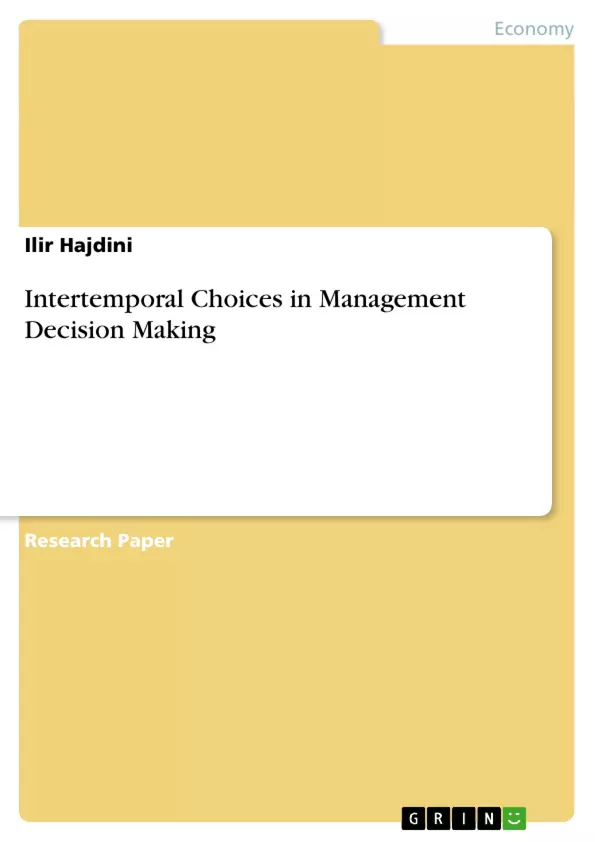This research paper will survey models and experiments for decisions involving outcomes of different amounts at different points of time. Experiments have shown that people like to get rewards earlier than later in time. This is what the concept of Intertemporal choice implies. Thus, this paper will consider theoretical concepts including discounted utility, hyperbolic and quasy-hyperbolic models as well as empirical results indicating how people really make such decisions.
Inhaltsverzeichnis (Table of Contents)
- Introduction
- Discounted Utility Model
- Eliciting methods and DU Anomalies
Zielsetzung und Themenschwerpunkte (Objectives and Key Themes)
This research paper aims to survey models and experiments related to intertemporal choices, focusing on how individuals make decisions involving outcomes at different points in time. It examines existing theoretical frameworks and empirical evidence to understand the complexities of such decisions.
- Intertemporal Choice and its implications
- Discounted Utility (DU) Model and its limitations
- Hyperbolic and Quasi-Hyperbolic Discounting Models
- Experimental methods for eliciting discounting rates
- Anomalies of the Discounted Utility Model
Zusammenfassung der Kapitel (Chapter Summaries)
Introduction: This introductory chapter establishes the concept of intertemporal choice, highlighting its relevance in various aspects of human behavior, from personal finance to long-term projects. It emphasizes the need for accurate models to understand how people discount the value of future rewards, foreshadowing the discussion of discounted utility, hyperbolic, and quasi-hyperbolic models in later sections. The introduction successfully sets the stage for a comprehensive exploration of intertemporal decision-making.
Discounted Utility Model: This chapter delves into the Discounted Utility (DU) model, a long-standing framework for analyzing intertemporal choices. It explains the model's core assumptions, including constant discount factors and the interplay between diminishing marginal utility and the positive rate of time preference. The chapter also discusses the model's mathematical representation, detailing the discount function and its implications for evaluating future outcomes. It explores the various assumptions (utility independence, consumption utility, and stationary utility), highlighting their roles in determining the overall utility of an option. While acknowledging the DU model's simplicity and wide application, the chapter lays groundwork for examining its limitations and anomalies in subsequent sections. Examples of how the model works and its application in scenarios like student decision-making are offered to improve understanding.
Eliciting methods and DU Anomalies: This chapter focuses on the experimental methodologies used to study intertemporal choices and reveals anomalies found in the DU model. It discusses the different elicitation methods employed in experiments designed to uncover how people make these decisions in real-world scenarios. The chapter then explores inconsistencies between people's observed behavior and the predictions of the DU model. These inconsistencies, or anomalies, are described as deviations from the normative DU equation, emphasizing that these deviations aren't necessarily signs of irrationality, but rather may reflect the impact of factors like risk, life expectancy, or changing preferences over time. Although these factors aren't examined in detail, they're introduced to provide context for the limitations of the DU model, making clear that the chapter explores the observed deviations from the DU model's predictions.
Schlüsselwörter (Keywords)
Intertemporal Choice, Discounted Utility, Hyperbolic Discounting, Quasi-Hyperbolic Discounting, Decision Making, Time Preference, Discount Rate, Discount Factor, Experimental Economics, Behavioral Economics.
Frequently Asked Questions: Comprehensive Language Preview of Intertemporal Choice
What is the overall topic of this research paper?
This research paper surveys models and experiments related to intertemporal choices – how individuals make decisions involving outcomes at different points in time. It focuses on understanding the complexities of these decisions by examining existing theoretical frameworks and empirical evidence.
What are the key themes explored in the paper?
Key themes include intertemporal choice and its implications; the discounted utility (DU) model and its limitations; hyperbolic and quasi-hyperbolic discounting models; experimental methods for eliciting discounting rates; and anomalies of the discounted utility model.
What models of intertemporal choice are discussed?
The paper primarily focuses on the Discounted Utility (DU) model, exploring its assumptions, mathematical representation, and applications. It also introduces and contrasts hyperbolic and quasi-hyperbolic discounting models as alternatives to the DU model.
What are the main limitations of the Discounted Utility (DU) model?
The paper highlights anomalies and inconsistencies between the DU model's predictions and observed human behavior in intertemporal choice. These deviations are discussed, suggesting that factors like risk, life expectancy, or changing preferences over time might contribute to these discrepancies.
What experimental methods are discussed in relation to intertemporal choice?
The paper details various experimental methodologies used to study intertemporal choices and elicit discounting rates from participants. These methods are used to gather data that is then compared to the predictions of the DU model to identify areas of divergence.
What is the purpose of the chapter summaries?
The chapter summaries provide concise overviews of the content of each chapter, including the introduction which sets the stage for the discussion, the detailed explanation of the Discounted Utility model, and the examination of experimental methods and anomalies within the DU model.
What are the key takeaways from the "Discounted Utility Model" chapter?
This chapter explains the core assumptions of the DU model (constant discount factors, diminishing marginal utility, positive rate of time preference), its mathematical representation, and its applications. While highlighting its simplicity and wide use, it also sets the stage for examining its limitations.
What are the key takeaways from the "Eliciting methods and DU Anomalies" chapter?
This chapter focuses on experimental methods used to study intertemporal choice and reveals anomalies in the DU model. It discusses inconsistencies between observed behavior and the model's predictions, suggesting that these deviations may reflect the influence of factors not explicitly included in the DU model (e.g., risk, changing preferences).
What keywords are associated with this research paper?
Keywords include Intertemporal Choice, Discounted Utility, Hyperbolic Discounting, Quasi-Hyperbolic Discounting, Decision Making, Time Preference, Discount Rate, Discount Factor, Experimental Economics, and Behavioral Economics.
- Quote paper
- PhD candidate Ilir Hajdini (Author), 2012, Intertemporal Choices in Management Decision Making, Munich, GRIN Verlag, https://www.grin.com/document/202566



